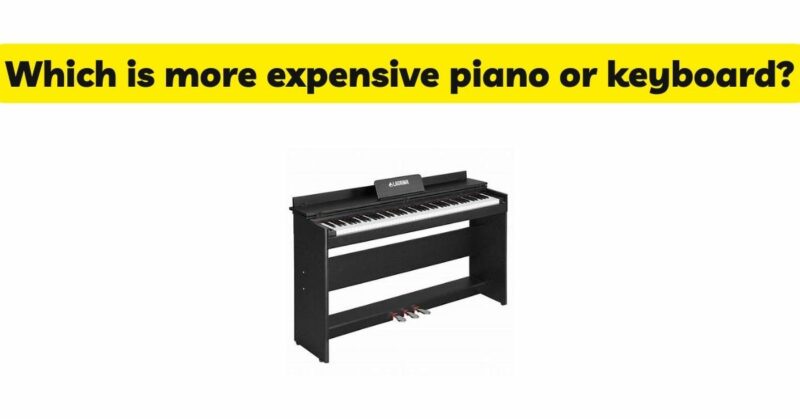When it comes to creating beautiful music, pianos and keyboards are two popular options that musicians and enthusiasts consider. However, one question that often arises is which instrument is more expensive. In this article, we will explore the factors that determine the cost of pianos and keyboards, allowing you to make an informed decision based on your budget and requirements.
- Types and Varieties: Pianos and keyboards come in various types and models, each offering unique features and capabilities. Pianos are typically categorized as acoustic or digital, whereas keyboards are primarily electronic instruments. Acoustic pianos, which include grand and upright pianos, are known for their traditional craftsmanship and rich sound, making them highly sought after. Digital pianos, on the other hand, are electronic instruments designed to mimic the sound and feel of acoustic pianos. Keyboards encompass a wide range of instruments, including synthesizers, arrangers, and MIDI controllers, which offer extensive sound customization and versatility.
- Acoustic Pianos: Acoustic pianos are often considered the pinnacle of musical instruments due to their intricate construction and timeless appeal. They are meticulously crafted with high-quality materials, including solid wood, premium strings, and hammers. These factors contribute to their rich, resonant sound and exceptional touch. Grand pianos, renowned for their impressive size and elegance, are generally more expensive compared to upright pianos, which are more compact and suitable for smaller spaces. The price of acoustic pianos can vary significantly depending on factors such as brand, size, age, condition, and craftsmanship. Well-known brands like Steinway & Sons and Bösendorfer are associated with higher price tags due to their exceptional reputation and craftsmanship.
- Digital Pianos: Digital pianos have gained immense popularity due to their technological advancements and affordability compared to acoustic pianos. They offer a range of features such as weighted keys, multiple sound options, and connectivity to external devices. Digital pianos use sampled sounds from acoustic pianos, allowing for a realistic piano-playing experience. While they may not fully replicate the touch and tone of acoustic pianos, they provide a practical and versatile alternative. Digital pianos are available in various price ranges, from entry-level models suitable for beginners to professional-grade instruments with advanced features. Factors that affect their cost include key action, sound quality, built-in features, and brand reputation.
- Keyboards: Keyboards encompass a wide range of electronic instruments, each serving specific musical needs. Synthesizers, for instance, are designed for sound synthesis and manipulation, making them ideal for creating unique sounds and effects. Arranger keyboards offer built-in accompaniment features and are commonly used in live performances and studio recordings. MIDI controllers, another type of keyboard, are used primarily for computer-based music production and offer extensive control over software instruments and digital audio workstations (DAWs). The cost of keyboards varies depending on the type, brand, features, and build quality. Entry-level keyboards are generally more affordable, while high-end professional models can be significantly more expensive.
- Additional Costs: When considering the overall cost of owning a piano or keyboard, it is essential to account for additional expenses. For acoustic pianos, regular maintenance, tuning, and potential restoration or repairs can add to the long-term cost. Digital pianos and keyboards may require accessories such as stands, benches, pedals, amplifiers, and additional sound modules, which can increase the overall expenditure. It is crucial to factor in ongoing expenses when budgeting for either instrument.
Conclusion: Determining whether pianos or keyboards are more expensive depends on various factors, including the type, brand, features, and quality of the instrument. Acoustic pianos, particularly grand pianos, are often associated with higher price tags due to their craftsmanship and reputation. Digital pianos offer a more affordable alternative while still providing a realistic piano-playing experience. Keyboards encompass a wide range of instruments, each with its own pricing structure based on functionality and features. Ultimately, the choice between a piano and a keyboard should be based on your musical goals, budget, available space, and personal preferences. By considering these factors, you can make an informed decision and embark on your musical journey with the instrument that suits you best.


